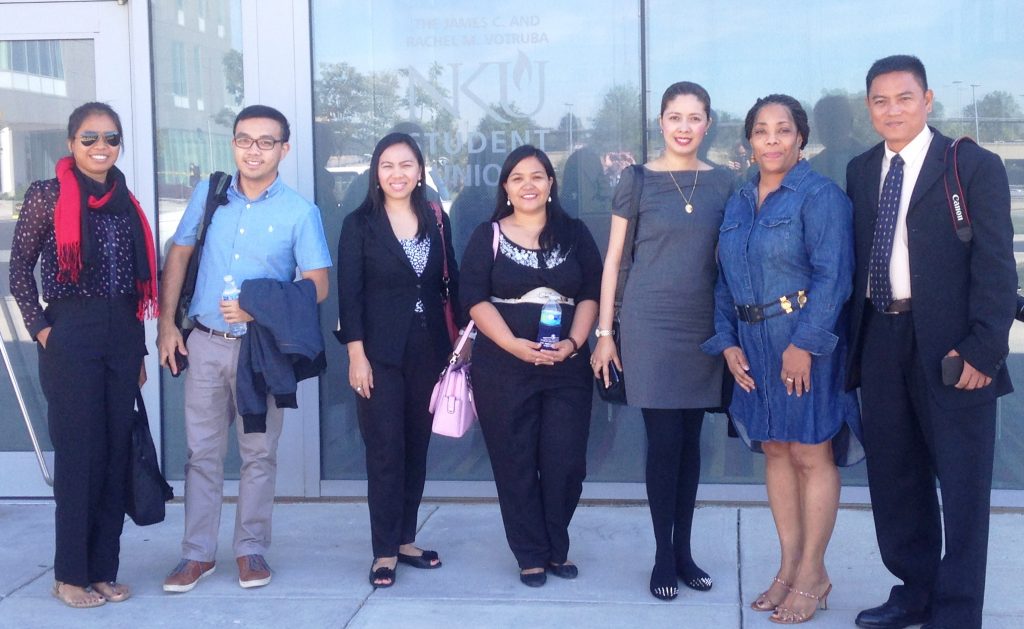“Power concedes nothing without demand”
 “Power concedes nothing without demand”, these words by Frederick Douglas were the emphasis of the U.S. Foreign Policy and Human Rights event that was hosted by GCWAC and led by speaker and activist Victoria Straughn. This morning at Northern Kentucky University’s Student Union, human rights activists from the Philippines participating in the International Visitor Leadership Program came to learn about Straughn’s strategies for winning the fight against oppression and discrimination.
“Power concedes nothing without demand”, these words by Frederick Douglas were the emphasis of the U.S. Foreign Policy and Human Rights event that was hosted by GCWAC and led by speaker and activist Victoria Straughn. This morning at Northern Kentucky University’s Student Union, human rights activists from the Philippines participating in the International Visitor Leadership Program came to learn about Straughn’s strategies for winning the fight against oppression and discrimination.
Among the six visitors from the Philippines was a senior reporter for the ABS-CBN Broadcasting System, a Provincial Clerk of Court, a security officer who is the Assistant Flag Secretary, the Officer in Charge of the Commission on Human Rights, and operations officer and an advocacy officer. Three of the six participants previously held military or police positions, some of them very high powered. The Philippines is plagued by a police state of brutal enforcement. The Officer in Charge of Commission on Human Rights is currently investigating the murder of 13 civilians at a military police checkpoint. The Philippines’ largest human rights threat is the abduction of women and children into the sex slave trade and forced labor slave trade trafficking systems. A topic many of the visitors are unfortunately very familiar with in their professional line work.
Straughn, an advocate for human rights and civil rights for over thirty years, talked about her experience in Cincinnati fighting for human rights when police brutality against African Americans was extremely high. Between 1997 and 2000 there were 20 murders of African American men by the police. Seven of the men murdered were unarmed and only two of the cases went to court.
Straughn, one of the leaders, organized the people in surrounding communities to reach out to city officials and demand change in police policies and the system of justice. These efforts came to the forefront of Cincinnati news in 2001 when police murdered unarmed teen Timothy Thomas. This fueled the rage over the murders of two unarmed African American men, Roger Owensby and Jeffrey Irons, who were both murdered by police within 24 hours in 2000. The protests and boycott of citizens, celebrities and national organizations against the city of Cincinnati led to millions of dollars in economical damage and ultimately a five year federal oversight requiring police departments to improve their policies. Most importantly, the police implemented changes in the way they treat and interact with citizens, especially in predominantly African American communities.
Almost 14 years later one can see identical riots and protests against the murder of an unarmed teenager in Ferguson, Missouri. Some believe that the militarization of police and the targeting of African Americans is a form of modern day terrorism that might move to international courts. After watching the same scenario repeat itself time and time again, Straughn stresses that passion and understanding on both sides of an issue is the key to pushing decision makers forward and placating the frustrated citizens who feel afraid of and betrayed by police.
Straughn says, “cultural differences come into play in everything” which is why the Greater Cincinnati World Affairs Council encourages the citizens of Cincinnati to be aware of current human rights problems in the area and to support the rights of every single person, in every community of every race, ethnicity, and religion.
By Genevieve Palmer
Genevieve Palmer is a Senior undergraduate student at Miami University studying Strategic Communications and an intern at the Greater Cincinnati World Affairs Council.


